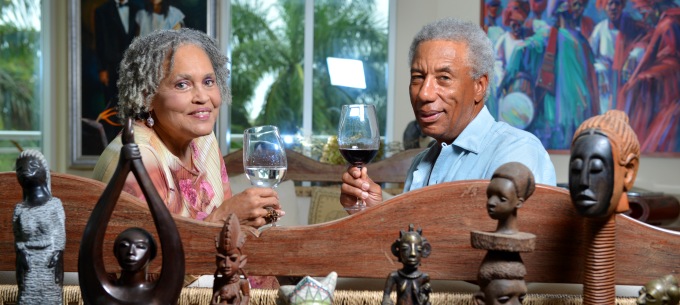
HAPPY FRIDAY, P.O.U. FAM!
RON AND CHARLAYNE GAULT
Passages Wines
South Africa

(From The Herald Tribune)
Passages from Africa
Charlayne Hunter-Gault’s life was forever changed on a day in 1961 when she and Hamilton Holmes became the first African-American students to enroll at the University of Georgia.
From that point on, and throughout her long career as a journalist in the U.S. and South Africa, she broke ground wherever she went, as a black female, a civil rights activist and a reporter who believed in writing about human stories more than just “the four D’s — death, disease, disaster and despair.”
First black staffer at the New Yorker.
First female Harlem bureau chief for the New York Times.
National correspondent for the MacNeil/Lehrer NewsHour.
Founder of the bureau in Johannesburg, South Africa for National Public Radio.
So is it any wonder that now, when she and her husband of more than 40 years – former banking executive Ron Gault – have settled into a Bay-view condo in Sarasota for at least half of the year, she is continuing her activism through yet another channel, the world of wine making?
Sitting in her new living room — an afternoon breeze blowing through curtains around the wide-open windows and surrounded by dozens of shonah – rock sculptures from Zimbabwe gathered during the couple’s nearly two decades in South Africa — Hunter-Gault tells a circuitious tale of how she got involved in something far afield from her award-winning journalism career, but close to her egalitarian beliefs.
“When we moved to South Africa, many of our friends were South African and the group we became closest to — all golfers because my husband is an avid golfer — loved wine,” she says. “So my husband and three guys started a wine they called Epicurean.”
Epicurean — a title Hunter-Gault finds “pretentious” — was established by Gault without his wife’s involvement, but Hunter-Gault was quick to remedy that omission.
“One day I was complaining about how there was still a lot of sexism in South Africa and how I was being excluded and Ron said, ‘If you’re interested, we can start our own wine.’”
That’s how Passages was born, the private label owned exclusively by the Gaults. It debuted in 2005, with a chardonnay; since then it has added a cabernet, a cab/merlot blend and, most recently, a pinotage, a uniquely South African varietal. (Epicurean produces only a small batch premium Bordeaux blend.) The grapes come from several different vinyards, none of which the Gaults own.
Wines under the Passages label are targeted to appeal to the American palate which, according to Gault, prefers a more fruit-filled, slightly sweeter wine, as compared to the South African tastes for a harsher minerality and smokiness.
“We’re not as enthralled with the big red wines as they are in South Africa,” he explains. “They like them hearty and robust, because the South African’s menu of choice is a big platter of meat. Ours are not a ‘meal in a bottle.’ They’re lighter and zestier and certainly distinguishable from other South African wines.”
Wordsmith that she is, Hunter-Gault came up with the name for the venture after rejecting everything suggested by a consulting firm.
“I felt like everything they recommended didn’t reflect us,” she says. “And as I began to talk, I said something like ‘This wine represents our passages through life…Passages. That would be a great name.’ And everyone liked it.”
Those passages included a 17-year stint in South Africa that stretched from its pre-apartheid years to the post-Nelson Mandela era, a time of great turbulence and turnover in a country the Gaults came to know and appreciate intimately. Shunning life in a gated community, where most Americans resided, they chose to live and socialize with the native population, welcoming everyone from locals to Winnie Mandela into their home for food, wine and conversation.
Passages currently produces 10,000 cases annually, 15 percent of which is retained for sale in South Africa; the remainder is primarily exported to Massachusetts, New York, South Carolina, Pennsylvania, Georgia, Texas and Florida. It sells for $15 to $17 a bottle ($14.99 here) and is available locally at the Butcher Block, Selva Grill, Mosaic, Michael’s on East and the Bobby Jones Grill (the latter due to Gault’s golfing connections).
Gault says the venture is “more than a hobby,” but admits that they are still struggling to break even. Now that the couple is back in the U.S. — splitting their time between homes in Sarasota, New York and on Martha’s Vinyard — they plan to devote more time and effort toward the marketing and sales of the label.
One way they are trying to do so is through “Talk and Taste” sessions in which Gault provides a wine-tasting after his wife — who has “probably interviewed (former South African president) Mandela more than any other journalist” — presents an update on the political, social and economic trends in South Africa since apartheid. They did the first of these locally as a benefit for the Sarasota Opera earlier this year.
“We learned to appreciate all the good things in South Africa and we want to share them with people who have not been there,” Hunter-Gault says.
Gault realizes that his wife’s near-celebrity status and extensive knowledge of and experience in South Africa is a marketer’s dream. They both hope to educate and inform while simultaneously creating a larger American market for Passages.
“People are eager to learn what’s happening in South Africa in the post-Mandela era,” he adds. “The news we convey represents currency.”
Hunter-Gault says she and her husband enjoy a glass of Passages wine “pretty much every day.” It’s one more pleasure added to those they have found in their new Florida home.
“Sarasota has lived up to the hype, the expectation,” Gault says. “There is enough curiosity here to have a robust intellectual and cultural life. We have a wonderful network of friends. And it’s warm.”
So warm, in fact, that the couple, who shun air-conditioning, have had to rent a chilled wine locker for their personal Passages stock.
FOR MORE INFORMATION: http://www.passages-wine.com
